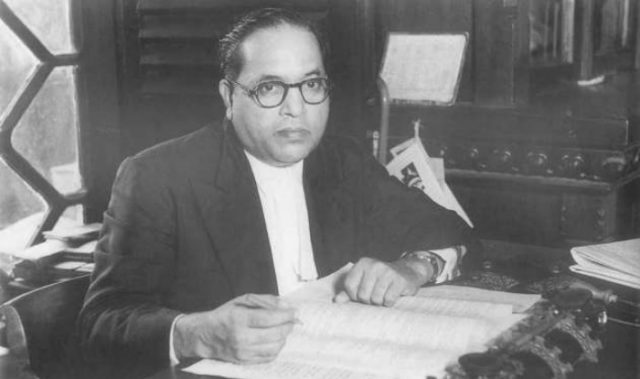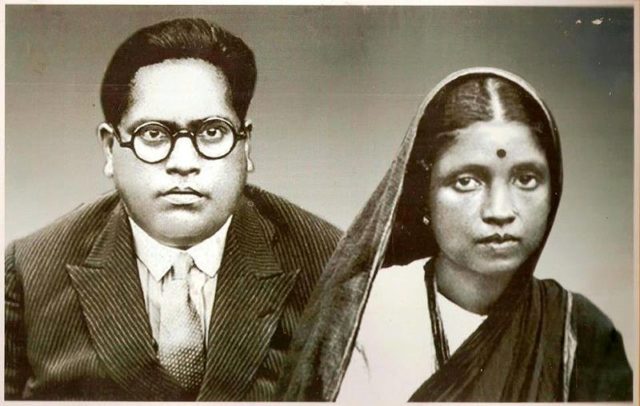PREVIOUS
Bhimrao Ramji Ambedkar - I
May 22 , 2019
2144 days
18916
0
- Bharat Ratna Dr Bhimrao Ramji Ambedkar was a scholar, a social reformer and a leader who dedicated his life to eradicating social inequality in India.
- He was a very well-known political leader, eminent jurist, Buddhist activist, philosopher, anthropologist, historian, orator, writer, economist, scholar and editor, too.
- He established an India of equals, a country which provided greater opportunities for people who were historically disadvantaged.

- He inspired the Dalit Buddhist movement and campaigned against social discrimination towards the untouchables (Dalits).
- He also supporting the rights of women and labours.
- He was independent India's first law and justice minister, the architect of the Constitution of India.
- He was a founding father of the Republic of India or Father of Indian Constitution, so that he also was known as Modern Manu.
- In India and elsewhere, he was often called Babasaheb, meaning "respected father" in Marathi and Hindi.
- Ambedkar is also known as "Bhim".
- In 1990, the Bharat Ratna, India's highest civilian award, was posthumously conferred upon Ambedkar.
Early and Personal Life
- He was born on 14 April 1891 in the town and military cantonment of Mhow (now Dr. Ambedkar Nagar) in the Central Provinces (now in Madhya Pradesh).
- He was the 14th and last child of Ramji Maloji Sakpal and Bhimabai Sakpal.
- His original surname was Sakpal but his father registered his name as Ambadawekar in school, meaning he comes from his native village of Ambadawe in Ratnagiri district.
- His Devrukhe Brahmin teacher, Krishna Keshav Ambedkar, changed his surname from "Ambadawekar" to his own surname "Ambedkar" in school records.
- In 1906, when he was about 15 years old, his marriage to a nine-year-old girl, Ramabai, was arranged.

- He lost his wife Ramabai during in 1935.
- Sharada Kabir, was a Saraswat Brahmin, whom he married on 15 April 1948, at his home in New Delhi.
Discrimination
- Ambedkar was born into a poor low Mahar (dalit) caste, who were treated as untouchables and subjected to socio-economic discrimination.
- Although they attended school, Ambedkar and other untouchable children were segregated and given little attention or help by teachers.
- They were not allowed to sit inside the class.
- When they needed to drink water, someone from a higher caste had to pour that water from a height as they were not allowed to touch either the water or the vessel that contained it.
- This task was usually performed for the young Ambedkar by the school peon, and if the peon was not available then he had to go without water.
- He described the situation later in his writings as "No peon, No Water".
- He was required to sit on a gunny sack which he had to take home with him.
Education
- In 1897, Ambedkar's family moved to Mumbai where Ambedkar became the only untouchable enrolled at Elphinstone High School.
- In 1908 he entered Elphinstone College the first from his Mahar caste to do so.
- By 1912, he obtained his degree in economics and political science from Bombay University, and prepared to take up employment with the Baroda state government.
- In 1913, Ambedkar moved to the United States at the age of 22.
- He had been awarded a Baroda State Scholarship, Gaekwad scholarship, established by Sayajirao Gaekwad III (Gaekwad of Baroda).
- It was designed to provide opportunities for postgraduate education at Columbia University in New York City.
- He passed his M.A. exam in June 1915, majoring in Economics, and other subjects of Sociology, History, Philosophy and Anthropology.
- He presented a thesis, Ancient Indian Commerce.
- In 1916 he completed his second thesis, National Dividend of India – A Historic and Analytical Study, for another M.A.
- Finally, he received his PhD in Economics in 1927 for his third thesis, after which he left for London.
- In this regard, Ambedkar was the first Indian to pursue a doctorate in economics abroad.
- On 9 May, he presented the paper “Castes in India: Their Mechanism, Genesis and Development” before a seminar conducted by the anthropologist Alexander Goldenweiser.
- In October 1916, he enrolled for the Bar course at Gray's Inn, and at the same time enrolled at the London School of Economics where he started working on a doctoral thesis.

- In this regard, Babasaheb was the first lawyer from backward class.
- In June 1917, he returned to India because his scholarship from Baroda ended.
- But later, He got permission to return to London to submit his thesis within four years.
- In the London School of Economics, Babasaheb completed 8 years of studies in just 2 years 3 months. For this, he studied 21 hours in a day.
- He returned at the first opportunity, and completed a master's degree in 1921.
- In 1922, he was called to the Bar by Gray's Inn and in 1923 he presented his thesis titled "The problem of the rupee: Its origin and its solution".
- He has described in his book that "If any country has to eliminate black money and fake currency, then after every 10 years Country's currency should be demonetized."
- He completed a D.Sc. in Economics in the same year.
- Babasaheb is the first and only person in the world to receive a valuable doctorate degree named "Doctor All Science" from London School of Economics.
- His third and fourth Doctorates (LL. D, Columbia, 1952 and D.Litt., Osmania, 1953) were conferred honoris causa.
Younger carrier
- In 1918, he became Professor of Political Economy in the Sydenham College of Commerce and Economics in Mumbai.
- Ambedkar had been invited to testify before the Southborough Committee, which was preparing the Government of India Act 1919.
- At this hearing, Ambedkar argued for creating separate electorates and reservations for untouchables and other religious communities.
- In 1920, he began the publication of the weekly Mooknayak (Leader of the Silent) in Mumbai with the help of Shahu of Kolhapur i.e. Shahu IV.
- In 1935, Babasaheb was appointed principal of the Government Law College in Mumbai.
- - - - - - - - - - - - - -
Leave a Reply
Your Comment is awaiting moderation.


